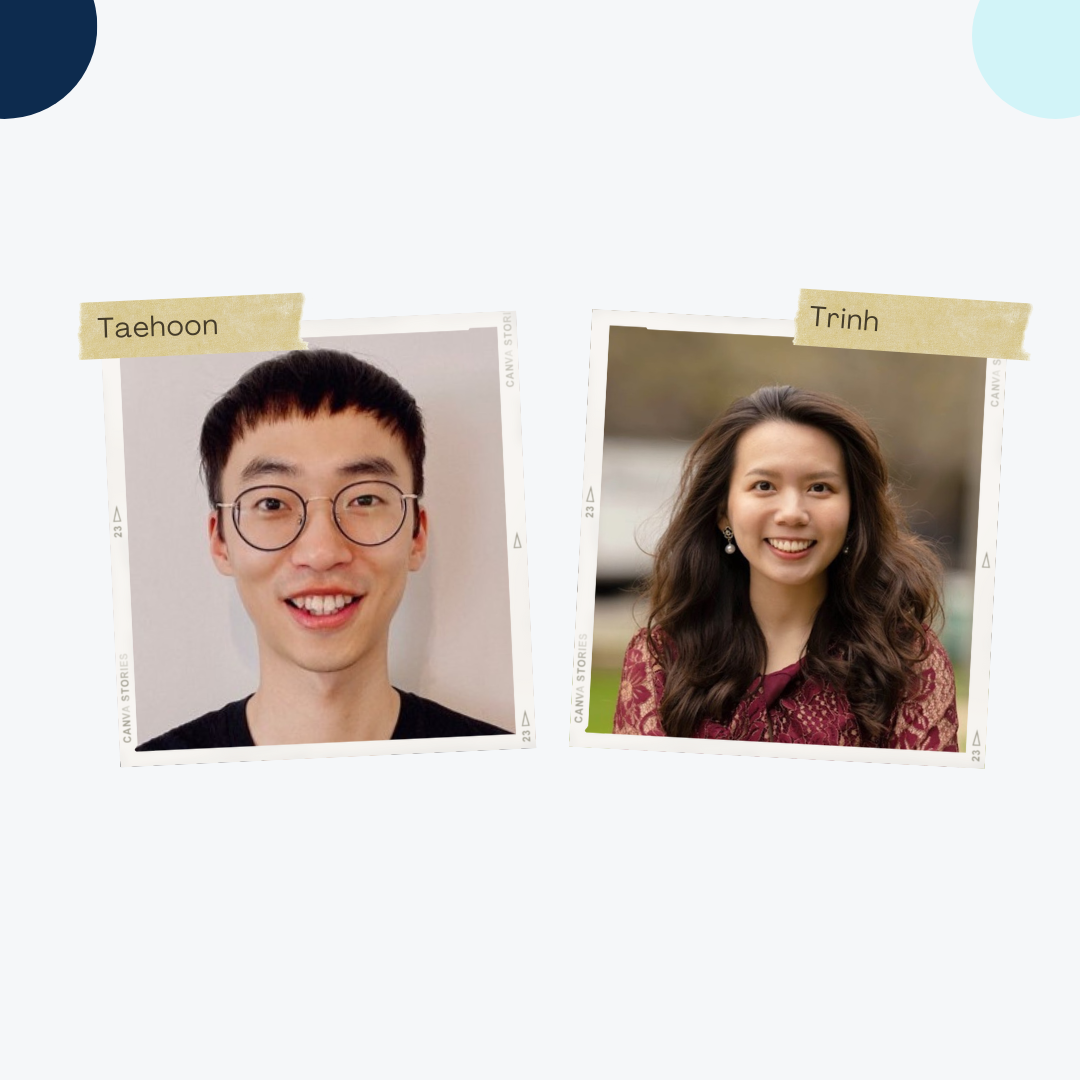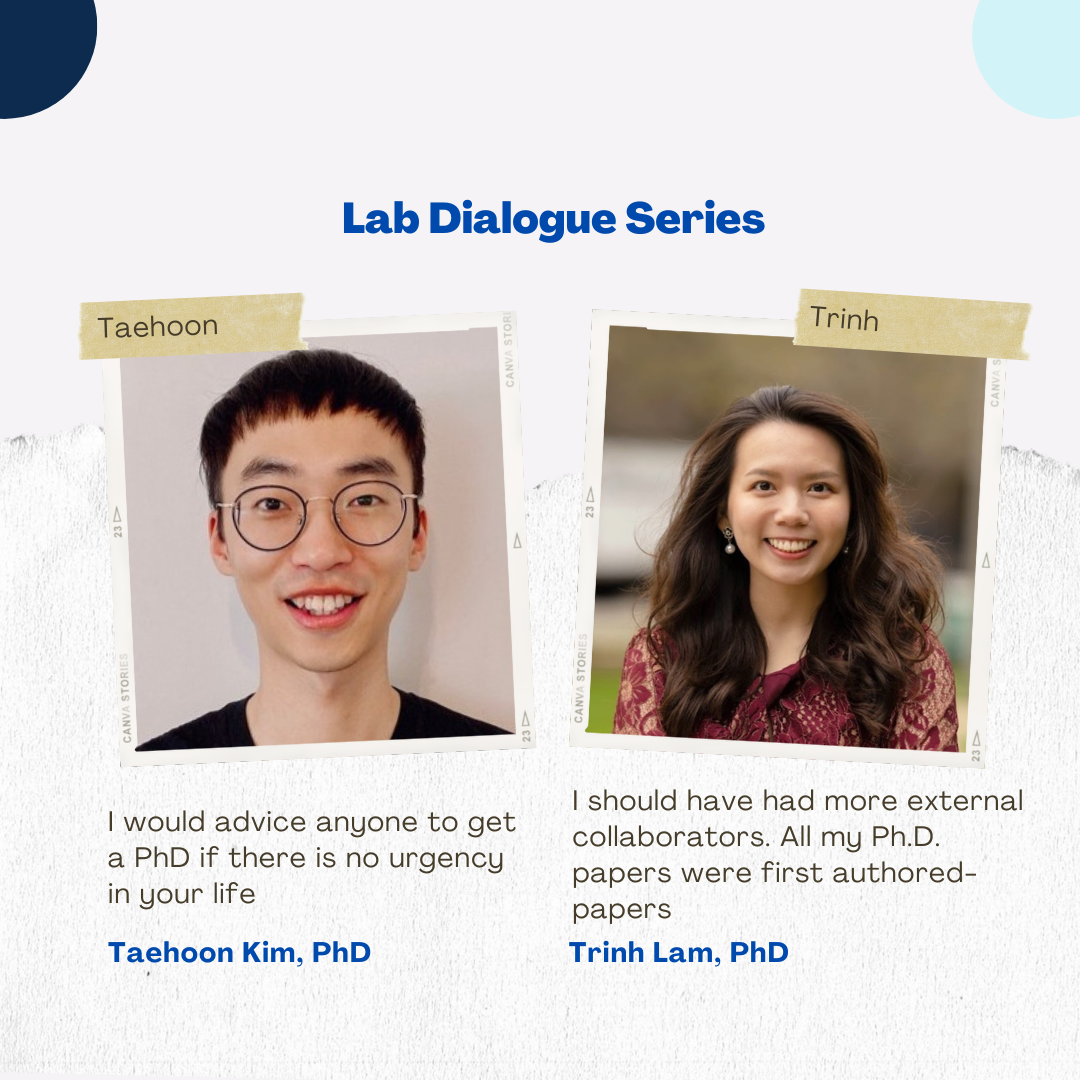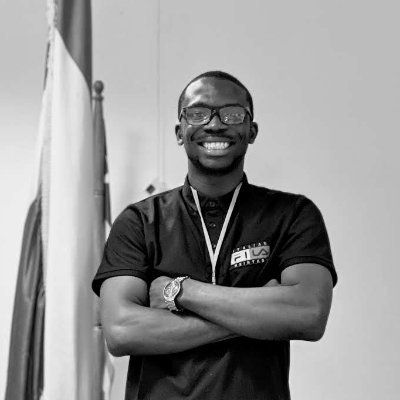
On Finding Fulfillment in My PhD Journey, Regrets and Lessons Learnt - Taehoon and Trinh
When it comes to publishing papers, it is important to understand that submitting your manuscript and getting rejected does not mean you are not good enough, it means the journal’s focus and readers are likely not the target audience for the type of research you have done.

In the debut episode of ‘Lab Dialogue Series’, you will be learning about two important people, Taehoon and Trinh. During my first two years as a graduate student, Taehoon and Trinh were a major highlight because of the fun trips we had in Chicago. They were also very kind and helpful to me.
I had the opportunity to interview these two amazing people and they were kind enough to respond honestly to my questions before leaving for their postdoctoral training.
Let’s dive in!
Can you briefly describe your research?
Taehoon: The retina is a thin yet sophisticated ocular tissue that converts light into electrical signals for vision processing. Currently, there is no outright cure for retinal and cerebral neurodegenerative diseases. Early detection is thus essential for their prediction, diagnosis, and prognosis. We have developed a custom-built spectral domain OCT system for optoretinography (ORG) measurement in mouse retinas. Different light conditions were applied to examine both light-evoked phototransduction response and dark-induced morphophysiological changes. We analyzed intrinsic optical signal (IOS) changes and alterations of hyper-reflective OCT bands. IOS data processing was refined, and imaging protocols were optimized in this study. In summary, my research enhanced the understanding of the optophysiological response of the retina under different light conditions and established an experimental basis for future clinical applications.
Trinh: Streptococcus pneumoniae (pneumococcus) is a Gram-positive bacterium that causes a million deaths of children, elderly, and immunocompromised annually due to pneumonia, septicemia, and meningitis. We hypothesize that the DNA uptake or cell attack by competent pneumococci is initiated by an external 1-2 µm long, 5-nm-diameter filament, called the com pilus. To obtain a more dynamic view of the pneumococcal competence pilus, we genetically introduced cysteine codons into major pilin ComGC with the objective that solvent-accessible cysteines could be labeled with fluorescently conjugated maleimide dyes. We demonstrated that this labeling strategy revealed that pneumococcal competence pili are highly dynamic, undergoing cycles of extension and retraction over timescales of seconds, and its retraction is required for DNA uptake. Then, to overcome the limitations of conventional bulk methods, we developed a droplet microfluidic system capable of isolating individual episodes of bacterial transformation between two pneumococci. To determine the relevance and reliability of this new method for the study of bacterial genetic transformation, we compared recombination events of recombinants recovered from the droplets vs. those in parallel bulk culture mixtures by whole genome sequencing. This study demonstrates that droplet microfluidics can provide a new method to study bacterial genetic transformation at the level of individual cells.
How would you describe your PhD journey?
Taehoon - My PhD journey was very nice. Although it was difficult, I had fun all the way. As a PhD student, you have protection from school and your advisor. Your time is flexible and not so stringent as being in the industry. You have the advantage to attend conferences fully paid for and, at this stage, the only thing I worried about was doing good research. Also, you have nothing to worry about if you make a mistake because people expect you to make a mistake since you are a student. So, it was a nice journey to me.
Trinh - I would describe my PhD journey with only one word, “grateful”. This is due to several human factors. I have met extremely smart people that I wouldn’t have met if I didn’t choose to enroll in a doctoral program. First, I am grateful to my advisors - Dr. Donald A. Morrison and Dr. David T. Eddington. They were big inspirations for me and treated me like their daughter, my awesome lab members (Adam, Duoyi, Mahesh). The amazing Professors I met during the conferences I attended. I am grateful for the numerous adventures I had during my PhD and I got to burgeon as a scientist.
What was your PhD routine like?
Taehoon - My PhD routine was typical like most PhD students. I wake up by 7 am, eat something light, shower and get to the lab around 8. I get lunch at 11:30 am. I try to consistently leave the lab daily by 5 pm. Then I eat dinner around 6 pm. For my first three years, I reviewed papers, did some data processing and worked till midnight. I always try to maintain this sleeping time even during exams, so I do not disrupt the circadian pattern and my body cycle. I had to go to the lab almost during the weekends too because of the type of experiment I was involved in. Performing experiments during the weekend is a lot better because there are few people in the lab so you can have less distraction, better focus and better results*. It is very important to have a constant schedule or habit like this for a PhD program, especially a program that involves a lot of experiments.
Trinh - My routine was very flexible and was predicated on the type of experiment and project I worked on at a particular time. I remember during my bacteria experiment, lunch and dinner were mostly skipped. The only thing that was constant during my PhD program was the ‘weekend experiment’. I also remember how I worked every single weekend, 7 days a week, for 6 months during a particular project I was involved in. Another reason for the flexibility of my routine was because of the facility’s availability. So most times, I had to adjust my schedule to be based on if the room, tool or resources to be used for my project will be available or not at a particular time.
How was balancing value/skill during your PhD?
Taehoon: The time I had for PhD research was sadly not enough. I was mostly focused on building the skills required for a successful doctoral program. However, I encourage students to try finding a balance between academic and non-academic skills.
Trinh: I followed this mantra during my PhD program—80 percent of my time was used for my academic life while I spent 20 percent of my time doing what I loved. My mental health is very important to me. For instance, I registered for a fitness class and piano lessons and some other kinds of activities like this to keep my mental health stable.
Would you advise anyone to go into a PhD program?
Taehoon: I would advise anyone to get a PhD if there is no urgency in their life. For example, a survey was carried out on old people to understand if there’s anything they wish they did in their younger years. Most of them wished they had invested more time in knowledge. That’s why I said if there is no current urgency in your life, you should probably get a PhD. Also, being innately curious and having enough grit, to me, is more important than being smart or having any form of ability.
Trinh: First, for those currently in a PhD program, it is important to take care of your mental health before anything else. Also, it is important to do a PhD not for money. Do it because you like to research. Any purpose other than that might make you quit during your PhD program. Do it because you are passionate about it as anything outside passion will fade away. Also, when you’re getting into a PhD program, please be more concerned about the lab you will be working with. Don’t go for only university ranking. Having a good lab to work with for 5 - 6 years of your research will be very helpful. When it comes to publishing papers, it is important to understand that submitting your manuscript and getting rejected does not mean you are not good enough, it means the journal’s focus and readers are likely not the target audience for the type of research you have done. Also, applying for a PhD program and getting rejected doesn’t still mean that you have failed, it can also mean that the professor/school does not have funding for your type of research. Learn how to stand up to rejection. Rejection may not only be about you.
Do you have any regrets about your PhD program?
Taehoon: Speaking about regrets, maybe I should have done more regular exercise to increase my stamina. I should have also enjoyed more outdoor activities in Chicago.
Trinh - Perhaps, I should have had more external collaborators. All my Ph.D. papers published were first-authored papers. This is because my PhD research was like a big story. I had no time to be involved in other research as mine mostly involved microfluidics and microbiology. It was not easy to be disconnected or to collaborate with other students based on the type of research I did. I honestly wish I had more time.
What lessons have you learnt that you think are transferable to students who are enrolled in a PhD program?
Taehoon: I will encourage new students to be self-motivated. A self-motivated student is constantly discussing new ideas and new projects with his/her advisor. Students who take initiative and lead a project conveniently are self-motivated but I do not think this can be transferred.
Trinh: Don’t procrastinate. It is very important. For your experiment, get a good notebook because you never know when you’ll need these data. In microbiology, your lab medium might be wrong but knowing what went wrong at each point can be a source of truth for you in future. People never believe if you tell them you are right. People believe data and it is a good source of evidence. Also, your lab is your family - never forget.
What are your plans for the next step? Academia or Industry?
Taehoon: Working in either academia or industry is not a matter. Wherever I am, I will be a scientist who enjoys the research.
Trinh: I am an incoming postdoctoral researcher in the Bay area but my concern is typically solving the immediate need of the world and expanding my abilities. I need to have a lot of skills and these skills can be transferable across board. But I will regard ’postdoc’ for me now as a safe option so that if in future I need to do research in academia, I can pivot. If I need to move to industry, I also can. But generally, I love learning and I am concerned about bridging the gap between academia and industry by having a lot of intertwined experiences.
If you were to get another PhD, what field will you consider?
Taehoon: I would likely get a PhD in genetics to better understand the biological codes of living things.
Trinh: I would likely get a PhD in microbiology. I love bacteria. I love biology. My PhD research was 50% microfluidics and 50% microbiology. I would love to learn it even further and be an expert in genetics. My Idol is Dr Jennifer Doudna.
How was your thesis style? What is story-based or chapter-based?
Taehoon: It was chapter-based. A cumulative of the different first-authored research publications I have made. So, I had different methods, different discussions etc.
Trinh: My thesis was story-based. So I had one big method, one big introduction etc.
Did you have any other mentors apart from your advisor during your PhD program?
Taehoon: I would say apart from my advisor, my committee members were the other mentors I had.
Trinh: My committee members and everyone that contributed to my publications mentored me directly or indirectly.
What was the most exciting memory you had in your PhD program
Taehoon: My mood was relatively the same. Moving to UIC was an exciting moment. Publishing first-authored papers were great moments. Going to the Bay area for a postdoc was a big achievement as well. These things happen rarely so the memories of it happening to me excite me every time I think about it.
Trinh: I have three big projects with a very touching story. But, I wouldn’t bore you with this story. However, I remember when I had to collaborate with other institutions. I sent some of my bacteria samples to that effect. Then, I was told that the bacteria sample contained some mutations. This meant that years of my research were in vain. I cried every day for two weeks. I had two supportive advisors who kept encouraging me and telling me that there is no way those mutations could exist in that sample. The most exciting moment for me was when we were later told by the institution that there was no mutation. You could have imagined how I felt, haha! I was so excited. Faith in humanity restored, lol.
With the way people tend to microwave their success, does writing paper come easy to you?
Taehoon: Writing papers doesn't come easy to me. After several publications, it has become clearer. I cannot compare how I was a few years ago to how I am and it gets better with time (but definitely not easy). You must have logic. You must tell a story and the story must be in pursuance with the result of the experiment.
Trinh: Paper writing doesn’t come easy to me. Apart from the logic involved, while writing a paper, there might be a need to carry out other experiments to explain your point more clearly. And even after writing your paper, you might still need to do other experiments to validate your result.
How did your relationship impact your PhD success?
Taehoon: Trinh really impacted my research a lot. She was always there for me. We helped each other, read each other’s work and supported each other. She was always positive, especially whenever I faced a roadblock. She directly impacted my PhD success in so many ways.
Trinh: Taehoon is a very supportive partner, and was very supportive throughout my PhD studies. During ups and downs, he understood me as a researcher. He understood the workload involved in my research. He has no discrimination against women in science and shares ideas about my research. Also, he was around to help me emotionally because getting a PhD can honestly be emotionally draining. He supports my career and he supports my life. Like I always say: Don’t find a prince. Be a queen and whoever you meet next in life might be a king.
What does fulfillment mean to you?
Taehoon: Fulfillment to me means you are doing what you are really excited about.
Trinh: Family is everything to me. I want to be able to take care of my family. I want to be able to take care of my life without worry. I want to be financially free.
Tobiloba Adejumo Newsletter
Join the newsletter to receive the latest updates in your inbox.

